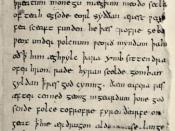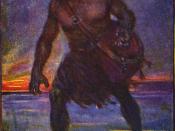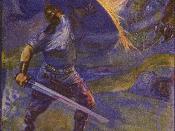The epic Anglo-Saxon poem Beowulf is a combination of Christianity and folklore that shows faith, loyalty, honor, and courage. Beowulf starts off young and self-aggrandizing, however as one sees him grow in the many fields of life one can get a deeper emotional feeling to Beowulf. Beowulf has many challenges and battles and as he matures he is able to defeat them. Although Beowulf is a warrior slaying creatures was not his only conflict, Beowulf still had an inner clash that he fought side to side with outer battle. Beowulf was a hero not only for his heroism in war on the contrary his valor in internal struggles, and being able to stare death in the face led him to reach his full potential and become the hero he was at death.
The monsters and daemons are slain in horrific details, exemplifying BeowulfÃÂs triumph over evil. Nevertheless there were still other battles; the internal battles of pride, greed, cowardice, betrayal, and self-concern are all fought as well.
It is agreeable that Beowulf was not greedy or a coward, just his might alone exemplified what one can do when one is fearless and gives all he has to the lives of others. Beowulf was able to fight the sea monsters with no land to hold him up, he defeated Grendel with no armor to protect his hide and no weapons to fight his war, and the titan fought the mother of Grendel even near death almost took him in the hell hole of the monsters den. Beowulf did all those deeds not only with out fear but as well with out any self-concern; his philosophy was that when it was his time to go he would go so there was no room for self-doubt. Beowulf was loyal and unselfish...


